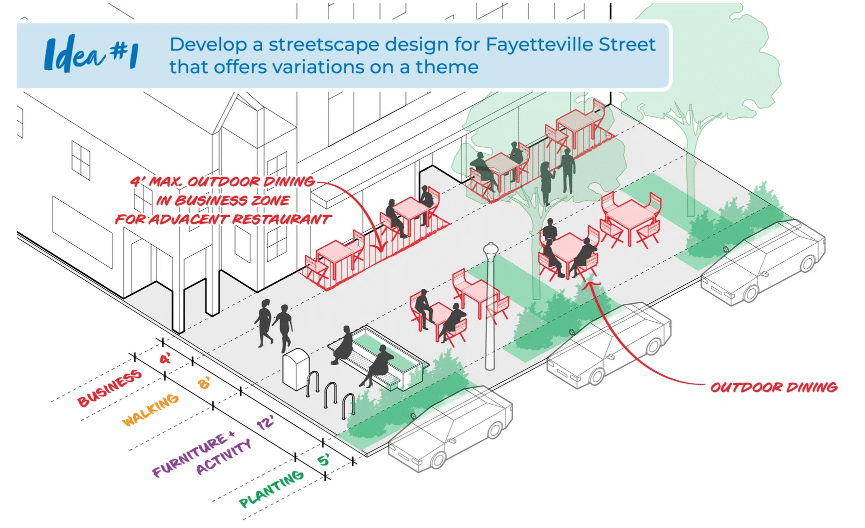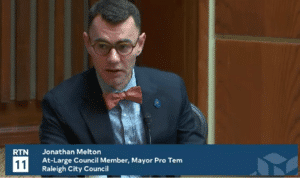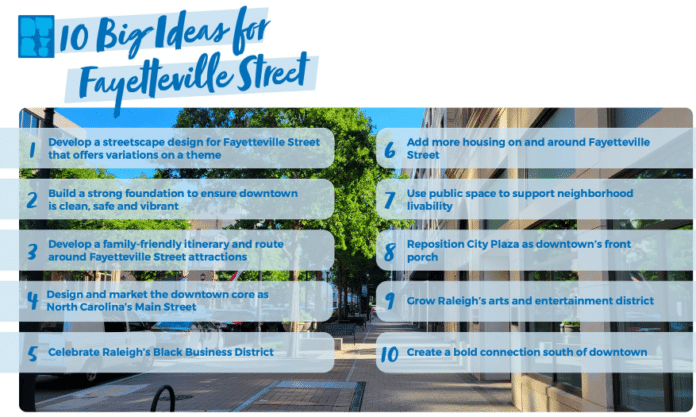North Carolina Construction News staff writer
Downtown Raleigh Alliance (DRA) and the City of Raleigh have released the first set of recommendations developed by the consultant team led by Interface Studio as part of the Downtown Raleigh Economic Development Strategy process.
Scott Page, principal at Interface Studio, presented the plan to Raleigh city council on Tuesday.
Ten recommendations focus on improvements to the Fayetteville Street corridor to catalyze downtown’s growth as the area continues to evolve.
“Activating Fayetteville Street” report features ten recommendations that outline bold ideas and opportunities for reinvigorating the Fayetteville Street area of Downtown Raleigh and creating more dynamic connections to surrounding neighborhoods:
The proposed plan is to develop a streetscape design for Fayetteville Street “that offers variations on a theme” with a vision of a lively place that attracts visitors and connects the surrounding neighborhoods.
Suggested improvements focus on updating seating, creating flexible space for activations and recreation, and delineating clear zones for business use.
There is also a recommendation to add housing on and around Fayetteville Street. That would include advocating for the redevelopment or conversion of strategic buildings into housing, encouraging development of parking lots to include housing and shared parking plans at garages to reduce development costs.
“The idea would be to fill in more housing over time to bring more residents to the core and make downtown feel more like a neighborhood.
Several sites have been proposed for housing and the plan also recommends new sites – parking lots and office buildings – that could be considered for development.
“The question of whether office buildings are suitable for conversion requires a lot more study,” said. “At this point we’re saying it’s important for us to push forward and push as much as we can to get more housing in the core, but whether we can rehab some of these older office buildings into housing is a question to be determined.”
Of the more than 5,300 residential units built or under construction since 2020, most are not on or adjacent to Fayetteville Street. Strategic redevelopment on Fayetteville Street, encouraging mixed use development and recruiting coffee shops and businesses that complement housing density, and addressing parking needs can bring a healthy mix of residents, workers, and visitors to support area businesses.
These strategies for Fayetteville Street will be integrated with other components of the plan – addressing the downtown retail and office markets, advancing and supporting Minority- and Women-owned business enterprises (MWBE), and identifying catalytic projects – to form a full economic development strategy in mid-2024.
City council voiced support for the plan, including council member Jonathan Melton who said he has been embarrassed when tourists point out that Raleigh’s main street which is “grey and baren.”
 “We can just start chipping away at this perception that it’s a corridor that has no identity and doesn’t have much activity,” Melton said. “I think we need to get moving on the big pieces and these interim pieces, this built environment … I think we need to get moving on that as quickly as possible.”
“We can just start chipping away at this perception that it’s a corridor that has no identity and doesn’t have much activity,” Melton said. “I think we need to get moving on the big pieces and these interim pieces, this built environment … I think we need to get moving on that as quickly as possible.”

